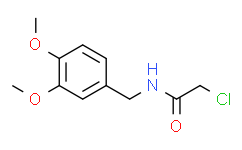| Cas No.: | 65836-72-8 |
| Chemical Name: | 2-Chloro-N-(3,4-dimethoxybenzyl)acetamide |
| Synonyms: | 2-Chloro-N-(3,4-dimethoxybenzyl)acetamide;2-chloro-N-[(3,4-dimethoxyphenyl)methyl]acetamide;2-Chloro-N-((3,4-dimethoxyphenyl)methyl)acetamide;Acetamide,2-chloro-N-((3,4-dimethoxyphenyl)methyl);C-Chlor-N-veratryl-acetamid;Chlor-essigsaeure-veratrylamid;chloro-acetic acid veratrylamide;N-(3.4-Dimethoxy-benzyl)-chloracetamid;N-(Dimethoxy-3,4 benzyl)-chloroacetamide [French];N-Chloracetyl-(3,4-dimethoxyphenyl)methylamin;N-chloroacetyl-3,4-dimethoxybenzylamine;DKM 2-93 |
| SMILES: | O=C(NCC1=CC=C(OC)C(OC)=C1)CCl |
| Formula: | C11H14NO3Cl |
| M.Wt: | 243.68676 |
| Purity: | >98% |
| Sotrage: | 2 years -20°C Powder, 2 weeks 4°C in DMSO, 6 months -80°C in DMSO |
| Description: | DKM 2-93 is a relatively selective inhibitor of UBA5 with an IC50 of 430 μM. |
| In Vivo: | DKM 2-93 daily treatment significantly impairs tumor growth of PaCa2 cells in vivo in tumor xenograft studies in immune-deficient mice without causing any weight loss or overt toxicity[1]. |
| In Vitro: | Ubiquitin-like modifier activating enzyme 5 (UBA5) is a novel pancreatic cancer therapeutic target. DKM 2-93 impairs pancreatic cancer cell survival through covalently modifying the catalytic cysteine of UBA5, thereby inhibiting its activity as a protein that activates the ubiquitin-like protein UFM1 to UFMylate proteins. DKM 2-93 inhibits PaCa2 and Panc1 cells survival with IC50s of 90 and 30 μM, respectively[1]. |
| Cell Assay: | PaCa2 and Panc1 cells are treated with 0-1000 μM DKM 2-93 for 48 hours. Cell viability is assessed by Hoescht stain[1]. |
| Animal Administration: | Mice: Mice are subcutaneously injected with PaCa2 cells to initiate the tumor xenograft study and treatments of mice are initiated with vehicle or DKM 2-93 (50 mg/kg ip, once per day) three days after injection of cancer cells[1]. |
| References: | [1]. Roberts AM, et al. Chemoproteomic Screening of Covalent Ligands Reveals UBA5 As a Novel Pancreatic Cancer Target. ACS Chem Biol. 2017 Apr 21;12(4):899-904. |

 DC Chemicals' products qualify for U.S. tariff exemptions. We guarantee no price increases due to customs duties and maintain stable supply, continuing to deliver reliable research solutions to our American clients.
DC Chemicals' products qualify for U.S. tariff exemptions. We guarantee no price increases due to customs duties and maintain stable supply, continuing to deliver reliable research solutions to our American clients.





















